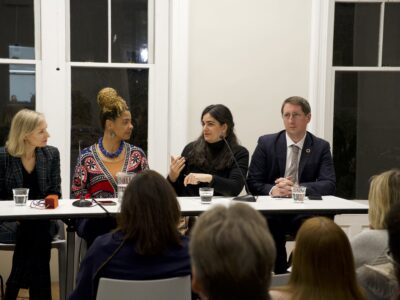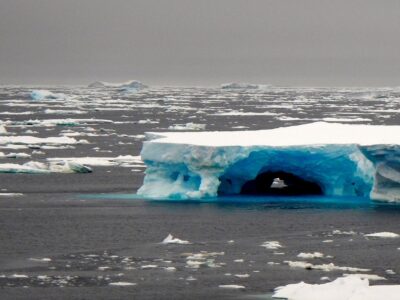
On April 4, Columbia MPA-ESP students organized a panel discussion with high-level United Nations officials and Columbia University faculty on the recent Paris agreement that resulted from the 21st Conference of the Parties to the United Nations Framework Convention on Climate Change, or COP 21, last December. With the support of The Earth Institute and the UN Studies Program Working Group, Arnaud Goessens and Jamie Rae Hanson organized the event in order to “keep the Paris Agreement momentum going forward towards a brighter future for our climate and planet.”
The speakers included Scott Barrett, Lenfest-Earth Institute Professor of Natural Resource Economics, Columbia School of International and Public Affairs; Michael B. Gerrard, Andrew Sabin Professor of Professional Practice in the Columbia Faculty of Law; Elliott Harris, UN assistant secretary-general and director, New York Office United Nations Environment Programme; Angelica Shamerina, program advisor on climate change, United Nations Development Programme/Global Environment Facility-Small Grants Programme. Earth Institute Executive Director Steve Cohen served as moderator.
Among the Paris agreement’s key provisions, signees were required to submit Intended Nationally Determined Contributions (INDCs); a more nuanced approach than previous climate talks that allowed each party to put forward their own reduction goals, with international reporting and review every five years. Additionally, at the end of this five-year period, nations will submit incrementally more progressive INDC goals. The agreement also asked developed nations to contribute $100 billion annually from 2020-2025 to aid with developing countries’ efforts for low-carbon growth and climate resiliency.
Panelists were impressed by the resulting international agreement that aims to hold “the increase in the global average temperature to well below 2oC above pre-industrial levels and to pursue efforts to limit the temperature to 1.5oC,” but expressed concern that the most challenging part of the process lies in the steps ahead. The panelists discussed the difficulties and complexities involved in reaching the climate target and the need to engage stakeholders on all levels.
Shamerina spoke to the need for assistance at the community level in developing nations and how developing countries can assist. “Even small-scale community efforts should be planned in synergy with INDCs and can make a significant contribution at the national level,” she said “At the same time, if considered part of larger frameworks such as INDCs, community initiatives could benefit from technical advice and additional funding [from developed countries].”
According to Harris, “Climate change is an extreme example of what happens when you do not have sustainable development. We will not address climate change unless we change the patterns of production and consumption that drove us to this situation in the first place.” He used examples of emerging economies that were supporters of technologies that have the ability to change the global energy landscape in a sustainable way — such as solar panels in China and biofuels in Brazil.
Cohen pointed to “technology that is simply better” than the carbon-heavy status quo, as a source of hope and optimism in addressing the problem.
The success of the Paris agreement will be largely dependent on political will. Barrett spoke to the changing attitudes regarding action on climate change and possible predictions for future momentum. “It’s quite extraordinary what was achieved [in the Paris agreement], however it’s not enough,” he said. “We need to take approaches that go back to what countries are good at — which is coordination.”
The ability to coordinate and take the climate crisis seriously may hinge on upcoming elections, especially those taking place in the United States this fall. “The most important decision that will be made in the world in the next several years will be the outcome of the U.S. election,” Gerrard said. “If the election goes a certain direction, the [Paris agreement] goes off the rails.”
Gerrard discussed the difficulties and barriers that were present in this agreement process and his views on the challenge ahead: “The Paris Agreement does encourage setting up market mechanisms [to address greenhouse gases], but it continues to be a voluntary [effort on the part of nations]. Until we have very real price signals, whether through a carbon tax or some other mechanism, it’s going to be hard to change widespread consumption behavior. The percentage of people who will do that voluntarily is very small.”
UN Secretary-General Ban Ki-moon has invited all world leaders to the Paris agreement signing ceremony on April 22 at the UN headquarters in New York. That day coincides with the observance of International Earth Day. On March 31, the United States and China, the world’s two most prolific greenhouse-gas emitters, confirmed in a joint statement that they will sign the Paris agreement on April 22. In their statement, they called on other countries to sign the accord as soon as possible, hoping it will enter into force this year.



